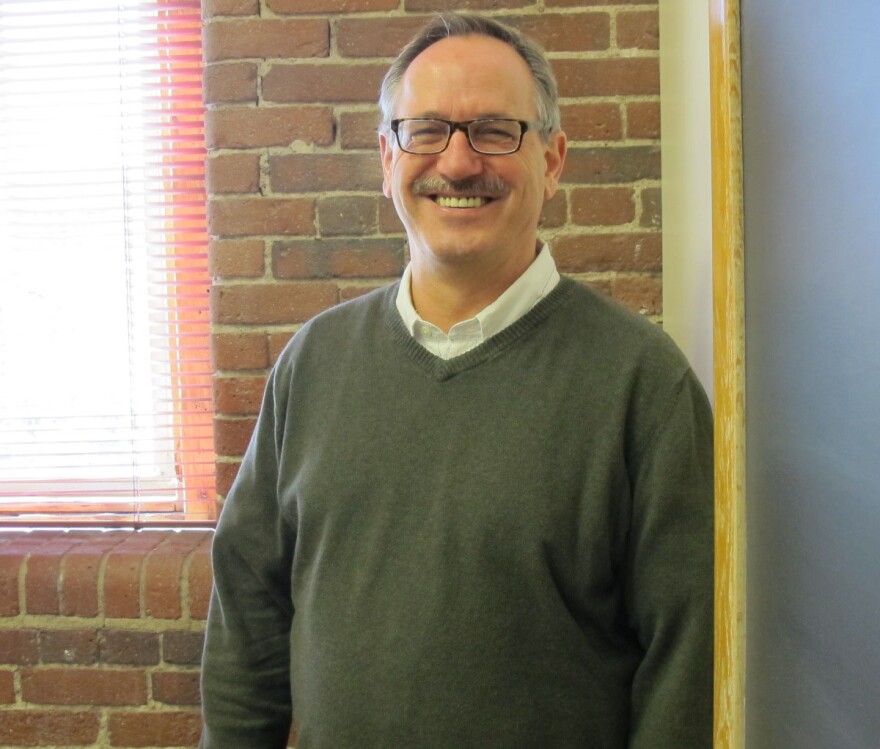Nine UNH-Manchester students are graduating this year with degrees in American Sign Language Interpretation. The college hosts one of just 13 accredited programs in the country. And given the high demand for interpreters, these newly-minted grads will likely find secure employment.
But they probably won’t be jumping in right after graduation.
Take 21-year old Ashley Potter. She graduates college soon. And like many seniors, she’s on the hunt for a job. “It’s kind of scary when you think about it. But at the same time, I feel like I’ve made good connections, and I’m on the right path," Potter says.
Her connections have come through UNH-Manchester’s American Sign Language—or ASL— program. Potter is set to get a degree in Sign Language Interpretation. And according to the Bureau of Labor Statistics, she has good reason to be optimistic. By 2020, the interpretation and translation field is projected to grow by more than 40 percent. That’s for all languages, including ASL.

Professor Jack Hoza directs UNH’s program. On this day, his students will watch a video, and interpret in real time. Their performance will be taped and critiqued. The class of four women clusters around a large table in the classroom. The atmosphere buzzes with pre-test jitters. Hoza opens by asking each student how she has prepared for the exam, if she has advice for her classmates, and how she expects to handle this simulation.
The last student's response begins with confidence, "You can be pausing the speaker and the signer and not thinking, 'Oh, I have to catch exactly what they say!' Because it's not live, you think, 'Oh, I just have to go with it.' You have to remember that you can stop it. Go back if you need to."
Then she pauses, before beginning more tentatively, "I think we can...right?"
This exchange provokes a hearty laugh from Hoza. He tells the class yes, they can pause the tape, but then elaborates, "Please do pause it. And that would be part of the assessment of the project, too, is do you pause so much it's a problem, or do you not pause when you really need to?"
Then he assures the class, "That's what happens in real life."
But earning a degree is just the beginning. Most grads gain experience for a couple of years, then test for a state license. Then a few years after that, they test for national certification—the main standard for ASL interpreters. The last UNH-Manchester alumni survey found about a third of ASL grads are nationally certified. Another third have a state license, while many others work in the Deaf Community. But despite these success rates, Hoza says studying ASL is a bit of niche.
“A lot of times people don’t think about this as a major," Hoza says. "There’s a great need in the deaf community. We hear that all the time from deaf people who say, you know, we need more interpreters for different situations.”

Most interpreters work for themselves, and get jobs from a referral agency, like Northeast Deaf and Hard of Hearing Services in Concord. Susan Wolf-Downes is Executive Director of the non-profit organization.
She is deaf as well, and ASL is her native language.
Speaking through an interpreter, she says hearing people often believe interpreting is simply “a beautiful job.”
“What they don’t realize is that this is a highly demanding job that requires a high level of competency, and background information, and what we call a ‘Deaf Heart,’ the person’s ability to identify with and support and be involved in the Deaf Community," Wolf-Downes says.
For many deaf people, ASL is their first language. But it’s more than just signing English words. It has its own vocabulary and grammar. Facial motions that look exaggerated to hearing people—a deeply furrowed brow, or eyebrows raised high—are part of the language. And since ASL doesn’t use writing, some native signers might not be as fluent in written English. Wolf-Downes says that can be a problem when deaf people need to go to the DMV, or the hospital.
“All deaf individuals can sign and we do well and we’re fine with our own language. But it’s the issue of trying to get services where the frustrations arise,” she says.
Under the Americans with Disabilities Act, deaf people are entitled to free interpreters in a variety of situations--especially when dealing with the government, employers, or medical issues. But their cost can make institutions balk. In New Hampshire, interpreters can make anywhere from $23 to upwards of $50 an hour. Also a lot of people—both hearing and deaf—don’t know the scope of the ADA, Wolf-Downes says. So native signers often muddle through…without an interpreter.

Even many experienced interpreters feel they aren’t qualified for certain situations. Sitting in a Manchester cafe, Jodi Lefort says she’s been in the field for nearly 20 years. She has special training for interpreting legal matters but, “I do not do a lot of medical interpreting, because it is not my forte," Lefort says. "Because we don’t want to be a hindrance to the deaf folks or the other people in the situation if we’re not familiar enough with it.”
ADA enforcement has tightened recently in New Hampshire. The Justice Department has called out at least three hospitals over the past few years for not giving patients interpreters. The cases were settled out of court. Hospitals say it can be tough finding qualified ASL interpreters.
Back at UNH-Manchester, Professor Jack Hoza says the ASL interpretation program is working hard to fill that need. “We have a plan over the next seven years to increase our program by at least 25 percent," Hoza says. "We would like to increase the number of interpreters out there.”
In the past, he says, up to a third of students were from out-of-state, but now the vast majority come from New Hampshire. And he hopes those home ties—and an expanded program at UNH—will help keep them here.







